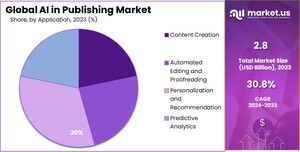AI in Publishing Market: The Future of AI-Driven Content Creation and Management
Body
AI in the publishing market is making a significant impact by transforming how content is created, managed, and distributed. Leveraging machine learning and advanced algorithms, AI technologies are streamlining various aspects of publishing, from automating editorial processes to enhancing reader engagement. This shift towards AI is reshaping the industry, enabling publishers to work more efficiently and connect with audiences in new and innovative ways.The Global AI in Publishing Market size is expected to be worth around USD 41.2 Billion By 2033, from USD 2.8 Billion in 2023, growing at a CAGR of 30.8% during the forecast period from 2024 to 2033.
Growth Factors
The growth of AI in the publishing market is driven by several key factors. First, the increasing demand for personalized content requires sophisticated tools to analyze and cater to individual reader preferences. AI's ability to process vast amounts of data quickly makes it ideal for this task. Second, the rise of digital media and the need for efficient content management systems have accelerated the adoption of AI technologies. Additionally, the drive for cost reduction and operational efficiency in publishing is pushing organizations to explore AI solutions that can automate repetitive tasks and streamline workflows.
Read More @https://market.us/report/ai-in-publishing-market/
Key Takeaways
- In 2023, Software was the leading component segment in the AI in Publishing Market, accounting for over 60% of the market share.
- In 2023, Cloud was the dominant deployment segment, holding more than 72% of the market share.
- In 2023, Natural Language Processing (NLP) was the leading technology segment, capturing over 35% of the market share.
- In 2023, Personalization and Recommendation was the top application segment, with more than 30% of the market share.
- North America led the market with a 40% share and generated USD 1.12 Billion in revenue in 2023.
Emerging Trends
Several emerging trends are shaping the role of AI in the publishing industry. One notable trend is the use of AI for content recommendation systems, which suggest articles, books, or other media based on user behavior and preferences. Another trend is the integration of AI with natural language processing (NLP) to enhance editorial tasks such as proofreading, content generation, and translation. Additionally, AI is increasingly being used to analyze reader engagement and optimize marketing strategies, helping publishers target their audiences more effectively.
Top Use Cases
AI in publishing offers several practical use cases that are transforming the industry. Automated content creation is one of the most significant, where AI tools generate articles, summaries, or even full-length books based on predefined parameters. Another key use case is AI-driven editorial assistance, which helps in proofreading, grammar checking, and style recommendations. AI is also used in personalized content delivery, where algorithms tailor recommendations to individual readers, enhancing their experience and increasing engagement. These use cases demonstrate how AI is improving efficiency and personalization in publishing.
Challenges
Despite its benefits, AI in the publishing market faces several challenges. One major challenge is ensuring the accuracy and quality of AI-generated content, as automated systems can sometimes produce errors or lack the nuanced understanding of human writers. Integrating AI tools with existing publishing workflows can also be complex and may require significant adjustments. There are also concerns about the ethical implications of AI, such as the potential loss of jobs for editorial staff and the need for transparency in AI-generated content.
Opportunities
The opportunities for AI in the publishing market are substantial. AI can significantly enhance content creation and management by automating repetitive tasks, allowing publishers to focus on more creative and strategic activities. It also offers the potential for better audience targeting and engagement through personalized recommendations and insights derived from data analysis. As AI technology continues to evolve, it is likely to bring even more innovative solutions to the publishing industry, creating new ways to connect with readers and streamline operations.
Conclusion
AI is poised to revolutionize the publishing market by enhancing efficiency, personalization, and content quality. While there are challenges to address, such as ensuring the accuracy of AI-generated content and integrating new technologies into existing workflows, the opportunities for growth and innovation are significant. As AI technology advances, it will continue to transform how content is created, managed, and delivered, leading to a more dynamic and responsive publishing industry. Embracing AI can help publishers stay competitive and meet the evolving demands of their audiences.













Comments